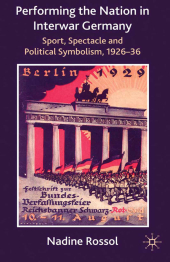 Neuerscheinungen 2010Stand: 2020-01-07 |
Schnellsuche
ISBN/Stichwort/Autor
|
Herderstraße 10
10625 Berlin
Tel.: 030 315 714 16
Fax 030 315 714 14
info@buchspektrum.de |

N. Rossol
Performing the Nation in Interwar Germany
Sport, Spectacle and Political Symbolism, 1926-36
1st ed. 2010. 2010. xiii, 226 S. 16 SW-Abb. 216 mm
Verlag/Jahr: SPRINGER PALGRAVE MACMILLAN; PALGRAVE MACMILLAN UK 2010
ISBN: 1-349-30407-7 (1349304077)
Neue ISBN: 978-1-349-30407-3 (9781349304073)
Preis und Lieferzeit: Bitte klicken
Performing the Nation in Interwar Germany argues that political aesthetics and mass spectacles were no invention of the Nazis but characterized the period from the mid-1920s to the mid-1930s. In so doing, it re-examines the role of state representation and propaganda in the Weimar Republic and the Nazi dictatorship.
List of Illustrations Acknowledgments Abbreviations Introduction Sports and Games, 1925-28 Staging the Republic: Constitution Day Festivities in 1929 Republican Nationalism: The Rhineland Celebration in 1930 Party Rallies and the Thingspiel in the Third Reich The Death of the Spectacle in the mid-1930s ´Like 100 years ago...´Local Festivities in Weimar and Nazi Germany Conclusion Notes Bibliography Index
´In Performing the Nation, Nadine Rossol highlights continuities in German political representation that transcended the historical divide of 1933, and, in so doing, she challenges the notion that the Nazis invented the mass spectacle...One of the greatest strengths of Rossol´s study is its depiction of the gradual evolution in the scale and assertiveness of the Weimar Republic´s self-celebration. Rossol´s study provides another important example of the continuities that linked the Weimar Republic and the Nazi regime, and she incorporates a great deal of material in this book that will be of value to cultural historians of the period.´
- Erik Jensen, Miami University, USA
NADINE ROSSOL is a Government of Ireland Postdoctoral Fellow in the History Department at the University of Limerick, Ireland, and works on twentieth century German history, in particular cultural and police history. She is currently working on a book studying the role of the police as educator in Germany. She received her doctorate from the University of Limerick in 2006.


